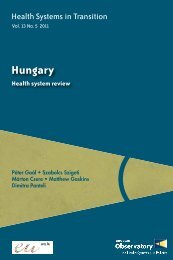Canada - World Health Organization Regional Office for Europe
Canada - World Health Organization Regional Office for Europe
Canada - World Health Organization Regional Office for Europe
Create successful ePaper yourself
Turn your PDF publications into a flip-book with our unique Google optimized e-Paper software.
30<br />
<strong>Health</strong> systems in transition <strong>Canada</strong><br />
health’s authority and responsibility <strong>for</strong> the health system is delegated to RHAs,<br />
which are responsible <strong>for</strong> allocating resources <strong>for</strong> a range of health services <strong>for</strong><br />
populations within a geographically defined region.<br />
<strong>Regional</strong>ization combines devolution of funding from provincial ministries<br />
of health to the RHAs with a centralization of governance and administration<br />
from individual health care facilities and organizations to RHAs. In most<br />
provinces, RHAs act both as providers and purchasers of hospital care and<br />
long-term care as well as other services delegated by provincial law. In Ontario,<br />
RHAs known as LHINs (Local <strong>Health</strong> Integration Networks) do not provide<br />
services directly; instead, they allocate resources among hospitals and other<br />
independent health organizations. While in some cases RHAs facilitated<br />
horizontal integration, in particular the consolidation of hospitals, the main<br />
purpose of regionalization was to gain the benefits of vertical integration. By<br />
coordinating or integrating facilities and providers across a number of health<br />
sectors, RHAs were expected to improve the continuity of care and reduce<br />
costs by encouraging more upstream preventive care and, where appropriate,<br />
substituting potentially lower-cost home, community and institutional services<br />
<strong>for</strong> more expensive hospital care. With funding from provincial ministries<br />
of health, RHAs are expected to allocate health resources in a manner that<br />
optimally serves the needs of their respective populations. However, no<br />
provincial government has delegated physician remuneration, including<br />
remuneration <strong>for</strong> family doctors who are responsible <strong>for</strong> the majority of primary<br />
care provision, or the administration of public prescription drug plans to RHAs<br />
(Lewis & Kouri, 2004) (Table 2.3).<br />
2.3.2 The federal level<br />
This section and the following two (2.3.3 and 2.3.4) provide a catalogue of<br />
federal, intergovernmental and nongovernmental national agencies and<br />
associations relevant to the health care system and their duties (see also Fig. 2.1).
















